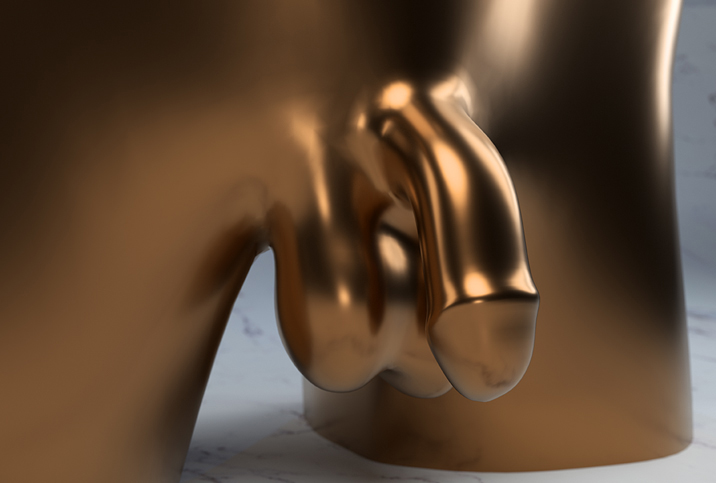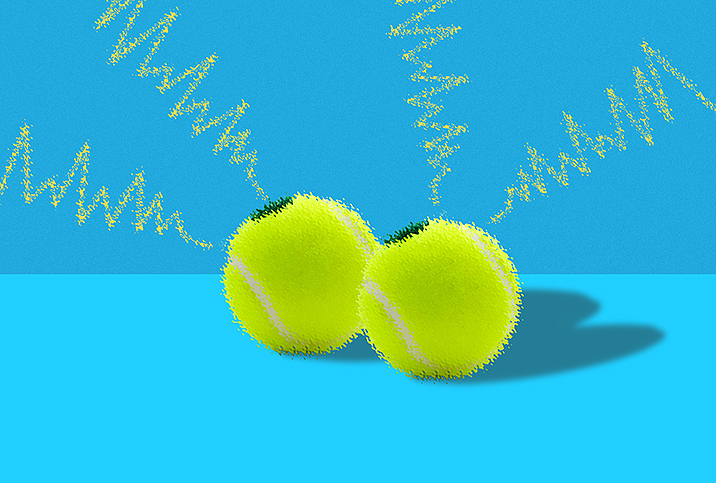Born With an Undescended Testicle? These Conditions Are More Likely

Cryptorchidism is the most common genital disorder identified at birth, according to the American Urological Association. Haven't heard of this condition? It's the medical term for something most people likely have heard of at some point.
"An undescended testicle, also known as cryptorchidism, is a condition where one or both testicles fail to move from the abdomen, where they develop in the womb, down into the scrotum before birth," said Justin Houman, M.D., a reproductive urologist and men's health specialist at Tower Urology in Los Angeles and the medical director for Bastion Health, an app-based telehealth platform for men.
About 1.8 percent to 8.4 percent of baby boys are born with cryptorchidism globally. Usually, this is discovered upon physical examination, but not always.
"If a baby is born with an undescended testis, usually if they're going to come down naturally, they come down by 4 months old," said Michael Werner, M.D., the medical director and founder of Maze Men's Sexual & Reproductive Health, based in New York City and Purchase, New York.
If the testicle hasn't come down by the age of 4 months, Werner added, then it needs to be brought down surgically, and often there's a hernia there that has to be repaired.
Even when cryptorchidism is found at birth and corrected, those boys are subject to a higher probability of certain testicular conditions later.
Conditions more likely in males born with an undescended testicle;
Of the congenital conditions associated with an undescended testicle, the most common is an inguinal hernia on the same side as the undescended testicle, according to S. Adam Ramin, M.D., a urologic surgeon and the medical director of Urology Cancer Specialists in Los Angeles.
"But an overwhelming majority of kids born with an undescended testicle do not have other congenital conditions," Ramin said. "Within the small percentage of kids born with congenital conditions associated with undescended testes, the two most common congenital conditions are prune belly syndrome and Klinefelter's syndrome."
If the undescended testicle is left untreated, it can cause other problems. According to Houman, untreated cryptorchidism could lead to the following:
- Infertility. Men with untreated cryptorchidism have a higher risk of infertility because the higher temperature inside the body can damage or kill the sperm-producing cells in the testicles.
- Testicular cancer. Undescended testicles are at a higher risk of developing testicular cancer. Men with a history of undescended testicles should perform regular testicular self-exams and see a doctor if they notice any lumps or changes in the testicles.
- Inguinal hernia. Men with undescended testicles are also at an increased risk of developing inguinal hernias, which occur when a part of the intestine pushes through a weak spot in the abdominal muscles and into the groin area.
- Testicular torsion. The risk of testicular torsion, a painful twisting of the testicle's spermatic cord that can cut off its blood supply, is also higher in men with undescended testicles.
- Psychological effects. Men with undescended testicles may also experience psychological effects such as low self-esteem, embarrassment and anxiety about their appearance.
All of this reinforces the importance of treating an undescended testicle early.
"If you don't bring it down, then it does not develop properly and has a much higher chance of developing cancer," Werner said. "It also has a much higher chance of being damaged with sex, and it stops producing sperm altogether."
Which leads to the topic of fertility.
How does cryptorchidism affect fertility?
Cryptorchidism could have an impact on fertility in males, Houman explained.
"The testicles are responsible for producing sperm, which is necessary for fertilization and reproduction. When one or both testicles are undescended, they are exposed to a higher temperature inside the body, which can damage or kill the sperm-producing cells," he said.
This can lead to a decrease in sperm count, reduced sperm motility (movement) and abnormal sperm morphology (shape), all of which can make it difficult for a man to father a child.
Treating an undescended testicle can help improve fertility, Houman said. Surgical intervention to bring the testicle down into the scrotum can help protect the testicle from the higher temperature inside the body and improve its ability to produce healthy sperm.
"The earlier the undescended testicle is discovered and brought down into the scrotum, the less chance of infertility in the future," Ramin said. "Testicles that are not surgically brought down into the scrotum early in life have a higher chance of poor sperm production."
What is vital to note, according to Houman, is that not all cases of undescended testicles can be successfully treated, and even with treatment, there is no guarantee of restored fertility.
If you have concerns about fertility or are having difficulty conceiving a child, it is important to speak with a healthcare provider who can perform a full evaluation and provide appropriate guidance and treatment options.
What symptoms should you look for?
In some cases, undescended testicles may not cause any noticeable symptoms. However, Houman said some signs that may suggest the presence of an undescended testicle include the following:
- Absence of a testicle in the scrotum. One or both testicles may not be palpable or visible in the scrotum.
- Smaller or underdeveloped testicle. The testicle that is undescended may be smaller or less developed than the other testicle.
- Groin or abdominal pain. Men with undescended testicles may experience pain or discomfort in the groin or abdominal area.
- Swelling in the groin or scrotum. An undescended testicle may cause swelling or a lump in the groin or scrotum.
- Difficulty with fertility. Men with undescended testicles may have difficulty with fertility due to the higher temperature inside the body, which can damage or kill the sperm-producing cells in the testicles.
Points to remember if you were born with cryptorchidism
One of the key points to realize is some data shows you're still at a higher chance of developing testicular cancer even if the undescended testicle is treated, according to Werner.
"The good thing about the testes is that they're sitting right outside the body, so they are easy to examine. I always tell the men who've had a history of cryptorchidism to check their testicles in the shower every month. They are looking for something that feels hard, like a marble in the tissue of the testicle," he said.
With this in mind, Houman added it's also important to attend regular follow-up appointments with a healthcare provider after treatment for an undescended testicle. The appointments help monitor testicle health and address any concerns or issues in real time.
Since men with a history of cryptorchidism may experience psychological effects, such as embarrassment or low self-esteem—which may be particularly true if they have a visible or palpable scar from surgery—Houman suggested seeking support from a mental health professional if these issues are causing significant distress.
Finally, remember that cryptorchidism may be hereditary.
"A man with a history of an undescended testicle should have his newborn boys examined carefully," Ramin said.
It's not always easy for men to seek help, especially for something as personal and sensitive as testicle troubles. Plus, a lot of them don't have a physician or therapist they see regularly, making that first step difficult. Video visits have become a viable option for most people, and more physicians and therapists have added them as a service. They're a good way to see a doctor quickly, as many offer same-day appointments.
Giddy Telehealth makes it easy to get connected to a qualified healthcare professional who can help with a variety of conditions. Whether you need the physical symptoms of an undescended testicle treated or you want to address any psychological issues, you can find a provider.
Editor's note: Do you have a personal story about cryptorchidism and how it affected you physically and/or emotionally? Giddy welcomes first-person accounts that break down stigmas and connect with readers to let them know they're not alone. To share your story, send a message to Mike Werling at mwerling@getmegiddy.com.


















